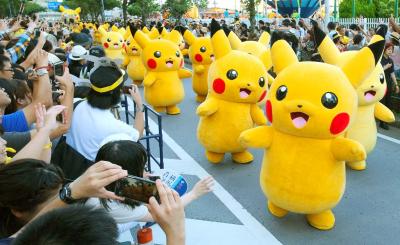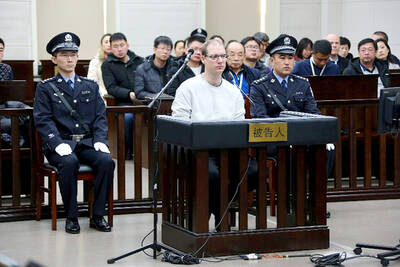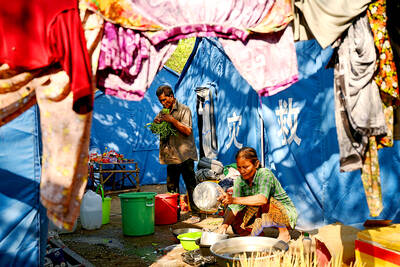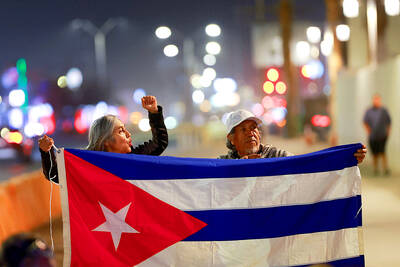Venezuelan President Hugo Chavez announced on Wednesday he would nationalize the country’s private airline Aeropostal, citing government allegations it is linked to international drug networks.
Chavez, whose military on Saturday took control of all the country’s major airports and maritime ports, said “we will renew [Aeropostal] as a social property.”
He compared the projected transformation to that of state-owned airline Conviasa, which was created from the shell of bankrupt Venezuelan airline Viasa.
Chavez also said there would be an effort to grasp total regulatory control of the country’s aviation industry.
But Humberto Figuera, president of the Airline Association of Venezuela, said that a final decision is pending on the airline’s expropriation, and its supposed links to drug trafficking.
Speaking earlier to governors and parliamentarians from his ruling United Socialist Party, Chavez announced the creation of two state firms to run the country’s ports and airports that were taken over from regional authorities.
At the meeting Chavez ramped up his political attacks, slamming opposition leaders as “bandits” and arguing that their “crimes” have gone “unpunished” due to their political position.
Also on Wednesday Venezuela’s military moved to take control of five smaller airports in the northwest of the country, after the weekend’s action that saw the military take control of all the country’s major airports and maritime ports.
The expropriation was legal, following a recently enacted law handing management of the facilities to the central government.
Soldiers occupied maritime terminals in the opposition stronghold city of Maracaibo, the port of Guanta and others.
The move was to “reverse the disintegration of national unity,” said Chavez, referring to the reversal of decentralization moves 20 years ago that handed authority of ports and airports to state governments.
“We are reunifying the motherland, which was in pieces. This is a very important step,” he said.
When Chavez announced the move last week he threatened to arrest opposition governors if they resisted.
Chavez also signed a decree on Wednesday to end government spending on luxuries as Venezuela’s oil earnings shrink.
“We must put an end to mega-salaries, mega-bonuses,” Chavez said. “He who wants to be rich, go elsewhere.”
Chavez first announced the decree as part of an economic package proposed on Saturday to combat falling oil prices. Venezuela, which relies on oil for 93 percent of exports and nearly half the government’s budget, has seen world crude prices erode 64 percent since July.
Chavez called not only for an end to fancy cellphone services but also for a shift away from a culture of excess spending.
“We’re tirelessly fighting against this — this old culture of waste,” he said in a televised address.
Critics said the measures fail to address Venezuela’s soaring inflation and slowing economic growth.
The belt tightening under the spending decree could include everything from whisky-fueled parties to unnecessary office remodeling. Excessive publicity, promotional material and publications will be off limits, said Chavez — whose own image is displayed widely on billboards and subway station posters.

China’s military news agency yesterday warned that Japanese militarism is infiltrating society through series such as Pokemon and Detective Conan, after recent controversies involving events at sensitive sites. In recent days, anime conventions throughout China have reportedly banned participants from dressing as characters from Pokemon or Detective Conan and prohibited sales of related products. China Military Online yesterday posted an article titled “Their schemes — beware the infiltration of Japanese militarism in culture and sports.” The article referenced recent controversies around the popular anime series Pokemon, Detective Conan and My Hero Academia, saying that “the evil influence of Japanese militarism lives on in

DIPLOMATIC THAW: The Canadian prime minister’s China visit and improved Beijing-Ottawa ties raised lawyer Zhang Dongshuo’s hopes for a positive outcome in the retrial China has overturned the death sentence of Canadian Robert Schellenberg, a Canadian official said on Friday, in a possible sign of a diplomatic thaw as Canadian Prime Minister Mark Carney seeks to boost trade ties with Beijing. Schellenberg’s lawyer, Zhang Dongshuo (張東碩), yesterday confirmed China’s Supreme People’s Court struck down the sentence. Schellenberg was detained on drug charges in 2014 before China-Canada ties nosedived following the 2018 arrest in Vancouver of Huawei chief financial officer Meng Wanzhou (孟晚舟). That arrest infuriated Beijing, which detained two Canadians — Michael Spavor and Michael Kovrig — on espionage charges that Ottawa condemned as retaliatory. In January

A sign hanging from a rusty ice-green shipping container installed by Thai forces on what they say is the border with Cambodia reads: “Cambodian citizens are strictly prohibited from entering this area.” On opposite sides of the makeshift barricade, fronted by coils of barbed wire, Cambodians lamented their lost homes and livelihoods as Thailand’s military showed off its gains. Thai forces took control of several patches of disputed land along the border during fighting last year, which could amount to several square kilometers in total. Cambodian Kim Ren said her house in Chouk Chey used to stand on what is now the Thai

NEW RULES: There would be fewer school days, four-day workweeks, and a reduction in transportation services as the country battles a crisis exacerbated by US pressure The Cuban government on Friday announced emergency measures to address a crippling energy crisis worsened by US sanctions, including the adoption of a four-day work week for state-owned companies and fuel sale restrictions. Cuban Deputy Prime Minister Oscar Perez-Oliva Fraga blamed Washington for the crisis, telling Cuban television the government would “implement a series of decisions, first and foremost to guarantee the vitality of our country and essential services, without giving up on development.” “Fuel will be used to protect essential services for the population and indispensable economic activities,” he said. Among the new measures are the reduction of the working week in